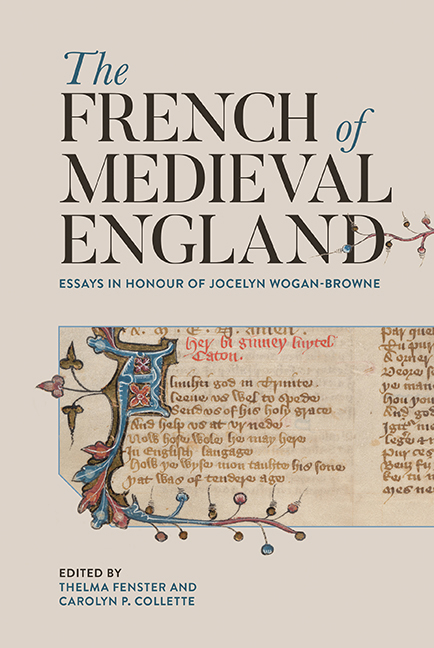Book contents
- Frontmatter
- Contents
- List of Illustrations
- List of Contributors
- List of Abbreviations
- Foreword: ‘The Light I Never Left Behind’: Jocelyn Wogan-Browne
- Introduction: Recognizing the French of Medieval England
- 1 The Gloss to Philippe de Thaon's Comput and the French of England's Beginnings
- 2 The Scandals of Medieval Translation: Thinking Difference in Francophone Texts and Manuscripts
- 3 Contrafacture and Translation: The Prisoner's Lament
- 4 Complaining about the King in French in Thomas Wright's Political Songs of England
- 5 The Chanson d’Aspremont in Bodmer 11 and Plantagenet Propaganda
- 6 The Use of Anglo-Norman in Day-to-Day Communication during the Anglo-Scottish Wars (1295–1314)
- 7 Middle English Borrowing from French: Nouns and Verbs of Interpersonal Cognition in the Early South English Legendary
- 8 William Langland Reads Robert Grosseteste
- 9 Disability Networks in the Campsey Manuscript
- 10 English Women and Their French Books: Teaching about the Jews in Medieval England
- 11 French Residents in England at the Start of the Hundred Years War: Learning English, Speaking English and Becoming English in 1346
- 12 French Immigrants and the French Language in Late-Medieval England
- 13 Fashioning a Useable Linguistic Past: The French of Medieval England and the Invention of a National Vernacular in Early Modern France
- 14 Admiring Ambivalence: on Paul Meyer's Anglo-Norman Scholarship
- 15 Twenty-First Century Gower: The Theology of Marriage in John Gower's Traitié and the Turn toward French
- 16 Royaumes sans frontières: The Place of England in the Long Twelfth Century
- Afterword
- Bibliography
- Index
- Publications of Jocelyn Wogan-Browne
- Tabula Gratulatoria
Introduction: Recognizing the French of Medieval England
Published online by Cambridge University Press: 12 August 2020
- Frontmatter
- Contents
- List of Illustrations
- List of Contributors
- List of Abbreviations
- Foreword: ‘The Light I Never Left Behind’: Jocelyn Wogan-Browne
- Introduction: Recognizing the French of Medieval England
- 1 The Gloss to Philippe de Thaon's Comput and the French of England's Beginnings
- 2 The Scandals of Medieval Translation: Thinking Difference in Francophone Texts and Manuscripts
- 3 Contrafacture and Translation: The Prisoner's Lament
- 4 Complaining about the King in French in Thomas Wright's Political Songs of England
- 5 The Chanson d’Aspremont in Bodmer 11 and Plantagenet Propaganda
- 6 The Use of Anglo-Norman in Day-to-Day Communication during the Anglo-Scottish Wars (1295–1314)
- 7 Middle English Borrowing from French: Nouns and Verbs of Interpersonal Cognition in the Early South English Legendary
- 8 William Langland Reads Robert Grosseteste
- 9 Disability Networks in the Campsey Manuscript
- 10 English Women and Their French Books: Teaching about the Jews in Medieval England
- 11 French Residents in England at the Start of the Hundred Years War: Learning English, Speaking English and Becoming English in 1346
- 12 French Immigrants and the French Language in Late-Medieval England
- 13 Fashioning a Useable Linguistic Past: The French of Medieval England and the Invention of a National Vernacular in Early Modern France
- 14 Admiring Ambivalence: on Paul Meyer's Anglo-Norman Scholarship
- 15 Twenty-First Century Gower: The Theology of Marriage in John Gower's Traitié and the Turn toward French
- 16 Royaumes sans frontières: The Place of England in the Long Twelfth Century
- Afterword
- Bibliography
- Index
- Publications of Jocelyn Wogan-Browne
- Tabula Gratulatoria
Summary
The phrase ‘French of England’, as Jocelyn Wogan-Browne has defined it, encompasses medieval England's francophony as it shaped a range of literary, social, political and commercial practices for nearly four hundred years, from the eleventh through the early fifteenth centuries. It links what seem at first to be incompatible terms – the French language, on the one hand, and England on the other. It invites scholars to embrace medieval England's plurilingualism and it beckons toward an exceptional and exceptionally well-documented instance of the flow and mix of several languages in multilingual cultures. The term implies the dynamism of linguistic movement and exchange that characterized medieval England, and in so doing it hints at the riches of a complex situation that the term ‘Anglo-Norman’ is not thought to evoke. Moreover, the conventional division between Anglo-Norman, deemed to cover the twelfth and thirteenth centuries, and ‘Anglo-French’, denoting the later medieval period, implies interruption where there was in fact continuity. The French language in England effloresced and then faded in some places and among some groups, only to appear and adapt itself among other groups and at other times. In short, a revised way of framing the question called for a new title.
The arrival of the French language did not suddenly bring multilingualism to the British Isles, already the home of a mix of Celtic, Germanic and Scandinavian vernaculars as well as of Latin. The ‘French of England’ asks us to understand medieval England's multilingualism not simply as the cohabitation in one geographical area of, say, three separate and contained languages but, rather, as a process, a set of unselfconscious interactions between speech acts or writing moments that used the resources offered by at least three languages: Latin, French and English. It was a diffuse, variable, dynamic phenomenon best envisaged not in a fixed linguistic or cultural configuration or existing in a rigidly circumscribed geography but as a process, its circulation an agent of expression and communication between individuals and groups.
- Type
- Chapter
- Information
- The French of Medieval EnglandEssays in Honour of Jocelyn Wogan-Browne, pp. 1 - 12Publisher: Boydell & BrewerPrint publication year: 2017



